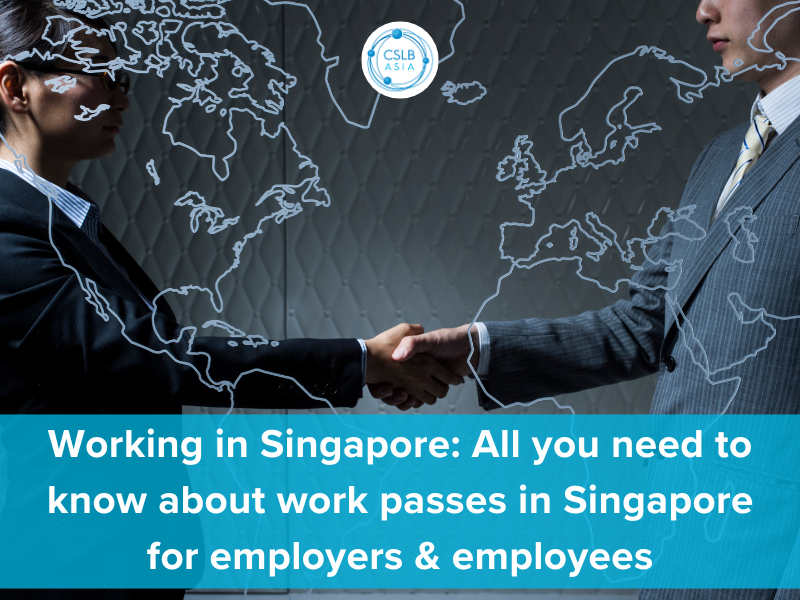Working in Singapore: All you need to know about work passes in Singapore for employers & employees
Last Updated 15 October 2024
Introduction
As a sought after destination for global talent, Singapore's Ministry of Manpower (MOM) is the primary regulator for employers and employees seeking to apply for or renew work passes.
There are a few of hoops to jump through when employers are seeking to hire foreign talent and employees looking for jobs in the Lion City
WORK PASSES VS WORK PERMITS IN SINGAPORE
Work permits are generally designated for skilled and semi-skilled workers from specific countries authorised to work in certain sectors like construction, manufacturing, and services.
Work passes, conversely, caters to more specialised and skilled professionals satisfying minimum salary requirements and may include high-tier positions like managers and executives.
A work permit is also available to Dependent Pass holders looking for an alternative to the Letter of Consent.
COMPASS: NEW WORK PASS SCORING SYSTEM
COMPASS is a multi-criteria scoring framework:
EP applications will be assessed based on both the individual applicant's and the hiring firm's attributes, split into 4 foundational criteria and 2 bonus criteria.
Passing Threshold: A minimum score of 40 points is mandatory for a successful application.
Exemptions: High-income earners (with fixed monthly salaries of at least SGD 20,000), certain intra-corporate transferees, and short-term roles (one month or less).
For more information, check out our blog.
WORK PASSES IN SINGAPORE - CONSIDERATIONS FOR EMPLOYER
1. Foreign worker quota and levies
Each company in Singapore is allocated a Foreign Worker Quota, which dictates the number of foreign workers that can be employed.
2. Pass or permit type
The Singapore Ministry of Manpower (MOM) lists six categories of Work Passes, each with several subtypes.
3. Application eligibility
The government sets minimum criteria that each foreign applicant must meet.
4. Document verification
MOM mandates the verification of critical documents such as educational qualifications, must be verified by MOM-accredited bodies before filing a work pass.
5. Exemptions
Certain short-term work activities may qualify for exemptions from the standard work pass or permit requirements. This includes foreign journalists, speakers, and religious workers.
Work passes and work permits in Singapore
FOR PROFESSIONALS:
Employment Pass (E Pass): For foreign professionals, managers, and executives with a minimum monthly salary and meeting other criteria.
Salary:
At least $5,000 for all sectors except financial services (increases progressively with age from age 23, up to $10,500 at age 45 and above)
At least $5,500 for the financial services sector (increases progressively with age from age 23, up to $11,500 at age 45 and above)
Criteria: Must have acceptable qualifications, usually a good university degree, professional qualifications, or specialist skills.
EntrePass: Aimed at foreign entrepreneurs launching businesses in Singapore.
Salary: No minimum salary, but applicants must meet business investment requirements.
Criteria: Must be starting a business in Singapore in specific sectors with a viable business plan and the skills to support that plan.
Personalised Employment Pass (PEP): For top-earning professionals offering more flexibility compared to E Pass.
Salary: Last drawn fixed monthly salary overseas should be at least a fixed monthly salary of at least $22,500. This is benchmarked to the top 10% of EP holders. For overseas foreign professionals, your last drawn salary should have been within the past 6 months of your application.
Criteria: Not tied to an employer and offers greater flexibility compared to an E Pass.
Overseas Networks & Expertise Pass(ONEPASS): Caters to foreign talent in fields like business, arts, and academia.
Salary: Minimum monthly salary of SGD 30,000 for the past 12 months.
Criteria: For high-achieving professionals in fields like sports, arts, academia, and research.
Tech.Pass: Unlike other work passes, the Economic Development Board of Singapore (EDB) administers this work pass. It is aimed at attracting top-tier foreign technology professionals, it grants flexibility to work, consult, or run a business, contingent on high-income and notable industry achievements.
Salary: Applicants must earn a last drawn fixed monthly salary (in the last 1 year) of at least S$22,500.
Criteria: Candidates must have a proven track record of tech-related contributions or leadership in recognised established or fast-growing tech companies.
FOR SKILLED AND SEMI-SKILLED WORKERS:
S Pass: For middle-level skilled staff earning a minimum monthly salary.
Salary: Earning a salary of at least $3,150, which is benchmarked against the top one-third of the local associate professionals and technicians (APT) salaries by age.
Criteria: Must undergo an assessment of qualifications, experience, and job type and employers must have adequate local talent quota before applying for this pass.
Work permit for migrant workers: Open to specific industries such as construction and manufacturing.
Salary: No minimum salary requirement, but salaries vary based on sector and approved source countries.
Criteria: For workers from approved source countries working in construction, manufacturing, marine shipyard, process, or services sector.
FOR TRAINEES AND STUDENTS:
Training Employment Pass: For professionals undergoing practical training.
Salary: No salary requirement, but applicants must be undergoing practical training for professional, managerial, executive, or specialist jobs.
Criteria: Must be confirmed by the employer and hold acceptable qualifications.
Work Holiday Pass: Enables students and graduates to work and vacation in Singapore for a fixed period.
Salary: No salary requirement as this is not primarily a work-driven pass.
Criteria: University students and recent graduates aged between 18 to 25 from eligible countries.
ADDITIONAL CATEGORIES - DEPENDENT’S PASS:
Family Member Passes: For spouses and children of work pass holders. For more information on dependent’s pass, check out our FAQs.
Exemptions: Specific roles or short-term assignments that may not require a standard work pass.
Case study from CSLB Asia on obtaining more niche EPs recently as rules have become stricter
CASE STUDY: A MATURE WORKER'S EMPLOYMENT PASS APPLICATION
Background
Applicant: A 58 years old, with no formal academic qualifications.
Occupation: Experienced managing director and service provider with over 35 years of expertise.
Company: A start up seeking to apply for an EP as Managing Director for their new Singapore service business.
CHALLENGES FACED IN THE APPLICATION PROCESS AND HOW CSLB ASIA OVERCOMES THOSE CHALLENGES.
Age Discrimination: Despite the applicants extensive experience and proven track record, his age posed a challenge in the application process. Singapore, while progressive, has seen instances of age discrimination in the workplace. CSLB Asia set out a detailed summary of the applicants work experience and skills in knowledge transfer and mentoring to junior staff.
Lack of Formal Qualifications: While the applicant’s practical experience is invaluable, the absence of formal academic qualifications might raise concerns about his suitability for the role. MOM required additional documentation and references to substantiate his skills and experience.
Salary Requirements: Given the applicant’s seniority and experience, his salary expectations might be higher than those of younger applicants. The company was required to justify the proposed salary to the MOM, demonstrating that it aligns with market rates for similar positions and that the applicant’s expertise warranted the higher compensation. In addition, the company was required to show a pipeline of clients/customers for the following 12 months and adequate capital to support the higher compensation.
Employment Pass Quota: The company had not commenced local hiring strategy. It was the applicant’s role to undertake the hiring strategy when he commenced work. The Company provided evidence of the hiring strategy and commitment to the plan.
By addressing MOM’s concerns regarding the Compass criteria deficiencies in the application and proactively providing compelling evidence of the application experience and the company’s long term plans in Singapore it resulted in a successful outcome for the applicant and the company.
Conclusion
Understanding the various work passes in Singapore is essential for both employers and foreign professionals seeking opportunities in Singapore. From the Employment Pass to specialised permits like the ONEPass and Tech.Pass, Singapore offers a range of options suited to different skill sets and industries.
Employers must stay up to date with MOM’s requirements, ensuring applications meet eligibility criteria, salary benchmarks, and comply with frameworks like COMPASS. Partnering with CSLB Asia offers expert guidance through Singapore's complex work pass process, helping ensure regulatory compliance and increasing the chances of successful outcomes for both employers and employees. Navigating these complexities effectively opens doors to Singapore’s dynamic workforce and its vast opportunities for global talent.
If you're looking for a partner to help streamline your work pass applications and ensure compliance with MOM regulations, contact CSLB Asia today. Get in touch with us here.
Last Updated 15 October 2024

